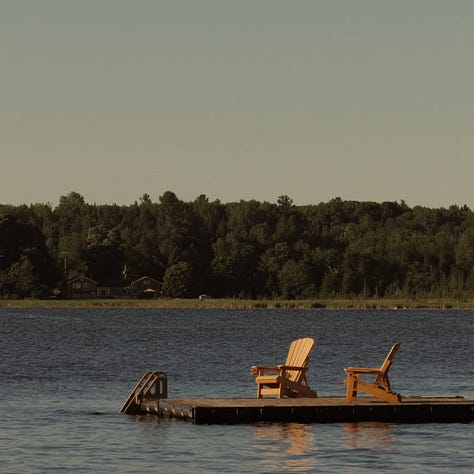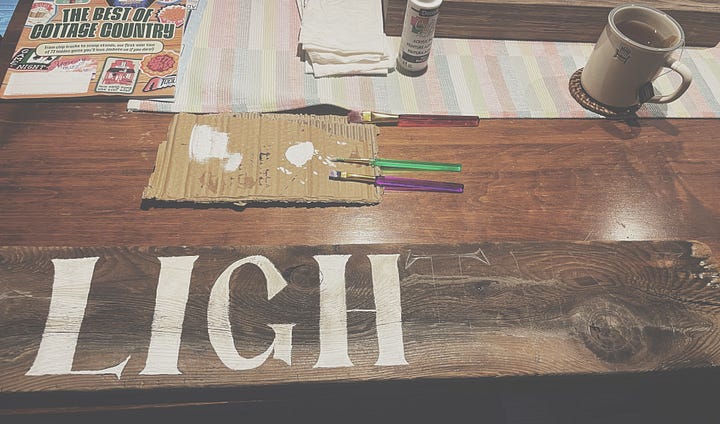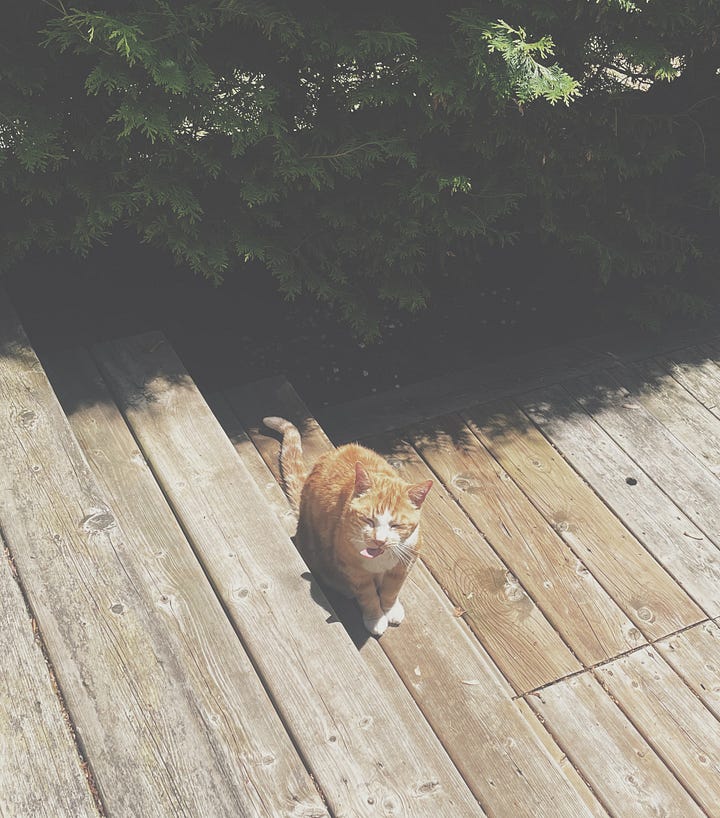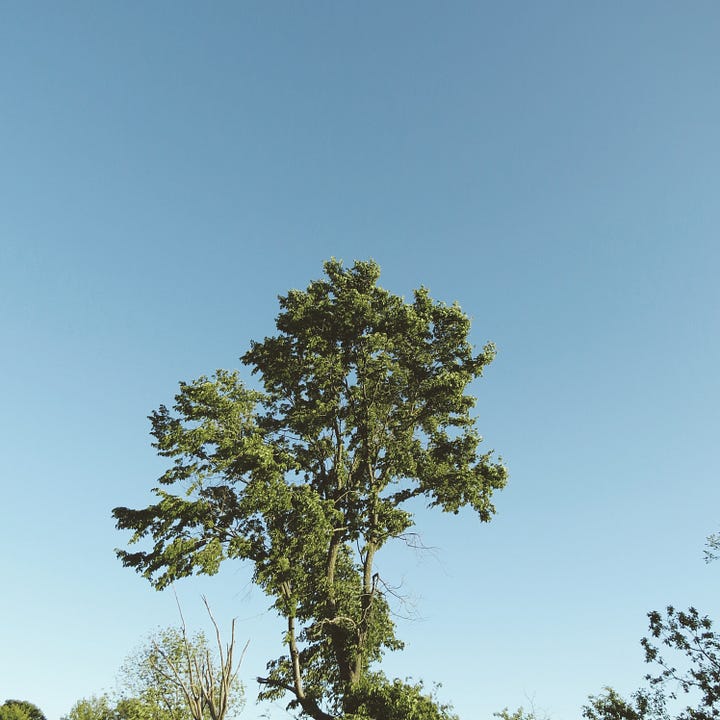Be tranquil as a forest,
But a fire within.
Marcus Aurelius broke my heart.
Once, I revered him.
Marcus was the emperor of Rome from 161 to 180 AD. The most powerful man in the entire world. He wrote Meditations, a book of personal maxims, never intended to be shared, that survived the sands of time and became the cornerstone of stoicism. His writing insists on poise and placidity in the face of life’s suffering and asserts that mastery over the mind is the path to happiness and the avoidance of pain.
Meditations is full of quotes like: “You have power over your mind - not outside events. Realize this, and you will find strength.” “The happiness of your life depends upon the quality of your thoughts.” “If you are distressed by anything external, the pain is not due to the thing itself, but to your estimate of it.”
But as I learned about Aurelius’ life, the results of living by this philosophy—the only real test of any life philosophy—I was crestfallen.
The Roman empire was fueled on fighting, beating back the barbaric tribes to expand their borders. But Marcus stopped the offensive campaign. Revenue from military operations fell and the empire entered the early stages of economic exhaustion.
A plague ravaged the land, killing 30% of the population in some regions. 10-18 million people died. Marcus only mentions the plague once in Meditations, touting that wickedness is worse than disease. The plague “can only threaten your life,” but the plague of evil, selfishness, pride, hypocrisy, and fear “attacks your humanity.”
On his death, from the plague, Marcus left the entire empire to his 18 year old son Commodus1.
Besides being too young to rule the world, Commodus was crazy. He believed he was the next Hercules and wanted to fight and kill animals all day instead of running the empire. History remembers him as one of the worst Roman emperors ever.
Marcus Aurelius’ rule marked the end of Rome’s golden age and the beginning of its decline. A Roman historian wrote, after Aurelius’ death, "our history now descends from a kingdom of gold to one of iron and rust".
I can’t help but wonder whether his stoic outlook was too… passive? Too removed from the world? Too insistent success lies solely within?
When he saw the empire beginning to crumble and observed the manic nature of his teenage son, perhaps Marcus was too fixed on his own resolve—the “quality of his thoughts” and the “power over his mind”—instead of his real responsibility to be an actor that can make things better. Perhaps by focusing only on his internal world, he ignored the external world all around him. That needed him. Perhaps he had every reason to feel distress, about the millions that died from disease or his lone son’s inadequacy to lead, in all its bitter pain. Maybe his emotions could have been a useful tool to determine what needed him most.
His philosophy served himself, but did it fail his community?
Was he too much forest and not enough fire?2
Jesus and Odysseus to the rescue
Regardless of whether you’re religious, Jesus, if nothing else, is symbolic of the perfect man3.
In the gospels, Jesus fed the hungry and healed the sick and even washed the feet of his apostles. And he’s constantly weeping. Deeply moved by the suffering and death and injustice of the world. But Jesus also went into temples in Jerusalem, flipped tables and kicked out the merchants and money traders with a whip4. His anger made enemies tremble.
Odysseus, the hero in Homer’s The Odyssey, shares striking similarities. Odysseus is a brilliant and cunning leader. Respected by all the men in the Greek army. Relied on for his strategy and wisdom but also his strength and bravery in battle. For Ancient Greeks, he was the image of the ideal man.
Reading The Odyssey, one thing that stood out was how much Odysseus cries. He cries when he misses home, he cries when his friends die. He cries for his crew and for his family. At a feast, Odysseus bursts into tears upon hearing a song about the Trojan War. Later, he sobs uncontrollably when reunited with loved ones.
On his return home from Troy, he learns there is a mob of corrupt men who have been crudely courting his wife, putting his estate into ruin, and plotting to murder his son. But Odysseus doesn’t kick the men out. He traps them in a room and kills them. All 1085.
Both Jesus and Odysseus were deeply involved in life, its sorrows, its joys, and the suffering of others. Moved by it. To tears or to action.
Both embodied this blend of strength and sensitivity, toughness and tenderness, courage and compassion.
They were whole.
Encountering the shadow
In an old English tale, King Arthur and the Knights of the Round Table are seeking the Holy Grail6. It’s symbolic of the thing you need most. To find the Grail, each Knight enters the forest surrounding their castle at the part which looks darkest to him.
The tale tells us: The thing you most need to find will be found where you least want to look. The cave you fear to enter holds the treasure you seek. The dragon hoards the gold.
I don’t cry often, but I have a closer connection to the sensitive, tender, compassionate side of myself.
I never raise my voice. I avoid arguments, refusing to enter them. Faced with fiery conflict, I ice people out.
At some point in my youth, I witnessed anger. I felt the heat of aggression and the sheer terror of someone’s short temper. At some point, I told myself I’d never be like that. I had to be calm. To compensate7.
So I buried my anger.
Instead, I wanted to be like Marcus Aurelius. Completely removed from the grip of emotion. Calm as a lake, regardless of circumstance or necessity.
But that singular approach isn’t sufficient.
There will be times in my life when I’ll need to take a stance and assert myself. To be angry, let it compel me to action. Flip some tables or kill some suitors (metaphorically speaking).
Part of my journey to become a more whole human is sifting through the sediment of suppressed anger and unearthing my assertive, aggressive nature8.
In his lectures on Personality, Jordan Peterson explains the necessity of developing your capacity for aggression, violence, even cruelty. It’s in you. It’s part of your nature. If you don’t, if you avoid it, you don’t understand yourself9. And you’ll almost certainly encounter someone who has that capacity and they’ll trample you.
This idea forms the philosophical foundation of martial arts: Learn how to exercise violence as a defense against violence.
Paradoxically, the capacity for violence helps you to avoid it, and knowing how to harm people makes you less likely to. But, you also have the skill in the rare occurrence you need it.
What is the ideal man?
The ideal man can’t be encapsulated in slick sentences or pretty paragraphs. Sure they’re a good son, brother, friend, father, husband. Sure, they provide and protect. Sure, they root themselves in service to others, generosity, contribution.
But it’s more than that. They have an embodied essence. Something that pulls at my attention.
Admiration is a mirror. It reflects the edges of my ideal. It tells me what I lack, what I need, who I want to become. Hopefully, who I will become.
So I’m noticing my admiration10. Burning the image of my ideal in my brain. Holding it up. Staying loyal to it.
Looking to the men I aspire toward. Men who are strong without sacrificing sensitivity, tough without losing tenderness, and courageous without forgetting compassion.
Letting them be my guide. Gradually becoming a collage of their natures.
Sorry Marcus.
Yours,
Thank you Kora (kora kwok 🌊) for your feedback on an early version of this piece.
My essays are entirely funded by patrons. If you value my work and want to support it (and get some exclusive content), the best way is by taking out a paid subscription.
If you enjoyed this piece but are not ready to become a paid subscriber, you can make a small, one-time donation in my digital tip jar here at Buy Me A Coffee. If you can.
👋 what i’ve been up to:
Attempting to remain cryptic while giving almost all my attention to wrapping up a very exciting project I’ve spent a year on that you’ll hear about next week…
Inspired by a wise friend, I began reading poetry for 10 minutes in the morning before work. Right now, I have a book of Rilke’s and Mary Oliver’s on my desk (perhaps my two favorite poets).
After soreness from the Spartan Race, I’m back to decent running form. Averaging 42km (a marathon) a week.
I’m fully licensed to hunt in Canada. I reckon it’ll be at least half a decade before any sort of proficiency, but I’m cultivating a love for patience.
✍️ quote i’m pondering:
Swiss psychiatrist Carl Jung on the importance of the individual:
“Ultimately everything depends on the quality of the individual, but our fatally short-sighted age thinks only in terms of large numbers and mass organizations...”
📸 photos i took:







Thank you for reading!
1- Leave a Like. If you enjoyed this post, please click the ❤️ below. I work hard on each essay and it helps support my work.
2- Spread some Love. If you want to make my day, share it with your people.
3- Get in Touch. If my writing resonates or if you just need a friend, please reach out. Always happy to chat! Reply to this email or leave a comment :)
The irony of his death strikes with the force of a cartoon anvil.
English author G.K. Chesterton was a bit more harsh:
"Marcus Aurelius is the most intolerable of human types. He is an unselfish egoist. An unselfish egoist is a man who has pride without the excuse of passion.
He and his friends had really given up the idea of any god in the universe and looked only to the god within… They had not enough interest in the outer world really to wreck or revolutionise it.
Thus the ancient world was exactly in our own desolate dilemma. The only people who really enjoyed this world were busy breaking it up; and the virtuous people did not care enough about them to knock them down."
To Chesterton, the most detestable people refuse to act, to fight, to participate actively in society.
In the Bible, it's said Christ will come back to earth as a judge. Psychologically, it’s exactly accurate. Your ideal is your judge. It looks down on you, perched high on the loft of unattainable perfection, and shows you all your shortcomings - all the ways you’re not everything you could be - in sheer radiance.
During his Sermon on the Mount, when Christ said “the meek shall inherit the earth,” meek didn’t mean the same thing as it does today. Meek was from the Greek word, praus, translated as “strength under control.” The praus person, according to Aristotle, is one who walks the middle way between recklessness and cowardice. Steady courage, perhaps.
This is intended hyperbole on Homer’s part but I think the message is: when faced with a serious threat, a man must be ruthless in defending his family.
Depending on which story you believe, The Holy Grail was either the chalice that Christ drank out of at the Last Supper or the chalice that caught the blood that gushed from his wound on the cross.
For boys who had weak or submissive men in their life often the opposite is true: they develop the capacity for violence and aggression at a young age and must learn in maturity how to be composed and calm.
“Anger is the purest form of care,” David Whyte writes, “the internal living flame of anger always illuminates what we belong to, what we wish to protect and what we are willing to hazard ourselves for.”
Anger is signal.
But anger has been pushed out of the modern palette of acceptable emotions. The Overton Window for emotion has shrunk and skewed feminine. It’s more socially acceptable to be sad than angry, yet I can’t see how it’s any less harmful.
Sasha Chapin writes:
“For men, fighting is as basic as sex, maybe more basic. If you haven’t acquainted yourself with that part of your nature, there is a fundamental element of your psychology that remains mysterious, and a fundamental human ability you haven’t explored. It’s likely that you are engaging in surrogate combat without realizing it, or suffering from suppressed aggression.
Two years of BJJ didn’t make me a good fighter, but it did give me more self-knowledge than an equivalent amount of therapy.”
Admiration is built into us from birth. Small children admire the bigger, older kids on the playground and follow them around. Imitate them.
We know exactly who we want to become and where we are headed—only if we open our eyes.
In my notes, I keep a list of male role models. Men I aspire toward becoming. Men whose essence I want to embody. It’s like I’m collecting clues, hints at how to be in this world. These men are both fictional and real, dead and alive, family or friends or famous, but they are all alike in my admiration.
Humans are forgetful creatures and I have to remind myself to keep returning to the person I want to be, again and again, every time I inevitably fall short or fall away.





I feel this! Not only what makes a good man but what makes a good human. It is how I try to live my life. I feel that modern medicine has Marcus' attitude when it comes to women's Healthcare.
I spent years with debilitating symptoms due to an unknown infection. I can't tell you how many doctors told me it was in my head... that being more careful of my thoughts combined with a "chill pill" would fix me.
Turned out what I needed was antibiotics, and alot of them. I was on death's door when I finally received them. There is so little action with this idea of how to meditate your way to happiness and good health, but that is not enough. Life requires a balance between the internal and external words like you say: Thought, emotion AND action.
Loved this piece! ❤️ THANK YOU!
In my view you are walking the path of the ideal man by developing your powers as a storyteller, which involves the diligent and disciplined review of the relationships, models, places, and principles that bring you to life. It's a gift to others and a mark of integrity to conduct that review in public.